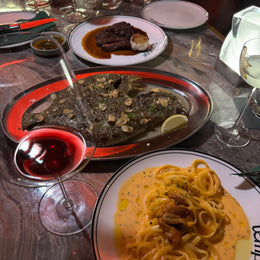
In the heart of Ho Chi Minh City's District 1 lies a street named in the honour of the renowned French microbiologist, Louis Pasteur, whose research led to breakthroughs in many areas, most notably pasteurisation of foodstuff. This is also where the first and flagship taproom of Pasteur Street Brewing Co was opened.


Started in 2014 by John Reid (a 7-year Vietnam expat) and Alex Violette (head brewer of a popular Colorado brewery), Vietnam’s trailblazing Pasteur Street Brewing represents a marriage of American craft brewing artistry with the rich tapestry of local Vietnamese ingredients. In those days, the only beer available in Vietnam was commercial Vietnamese rice lagers that are poured over ice in a glass – highly refreshing but without huge variation. The founders aimed to quench the thirst of expats and locals who didn’t have too many beer options then.

The brewery proudly uses high quality imported malt from Belgium and Germany, hops from America, Australia, and New Zealand, while infusing their brews with Vietnam’s natural bounty of fruits, herbs and spices that tell a story in every sip.

The brewery’s first ever brew was the Jasmine IPA. This was born from a desire to create a balanced but hoppy IPA with a Vietnamese distinctness. It is infused with Citra hops, the most popular American craft brewer’s aroma, and jasmine flowers grown in Sa Pa – a cloud-shrouded town in the exotic northern highlands of Vietnam.

From these inspired beginnings, Pasteur Street Brewing has flourished to become one of Vietnam’s most well-known craft brewer. The company now runs a whopping 7 taprooms in Ho Chi Minh City and 2 in Hanoi, and the brand is known across Asia as one of the must-try craft beers in Vietnam for a craft beer pilgrim. The brand took its name from the name of the street on which its first taproom was opened.
And so find it I must.

I began in the vicinity of Ben Trang market before I found 144 Pasteur Street sitting amidst the aromatic allure of coffee shops and restaurants.

I proceeded up a quaint alleyway off the street and follow a trail of signs like breadcrumbs that eventually lead to the sanctuary for beer lovers, a retreat from the humidity and hum of scooters outside. Its doors open at 11 AM, and like I say, it is a sanctuary because no one's gonna raise an eyebrow if you fancy a pint in the morning.

Décor, layout and vibe
This seems like a historical Vietnamese shophouse, very narrow in front but vertically expansive, with many narrow floors stacked over each other – I was told that this odd architecture was very popular as it reduced reduce property taxes hundreds of years ago. Due to the architecture, you’ve got to climb a couple flights of stairs in a mini adventure, rewarded with the promise of a refreshing drink at the top.

Inside, the taproom itself is a far cry from what you might expect of a typical westernised craft beer place or craft beer bar. It's got this relaxed, rustic vibe that's both casual and slightly bohemian, with a flood of natural light that gives the space a light, airy feel. It more resembles a cosy café or a high-end modern bistro with a communal space where everyone seems to be engaged in lively conversation in a relaxed Saturday morning vibe.

As for the music, think nostalgic classic pop and rock from the 80s and 90s – tunes like “Stairway to Heaven” and “Smoke on the Water” playing in the background. The patrons were a diverse mix with expats and locals, some deep in conversation with the bartender while another was lost in the pages of a book.
Drinks Selection

Over a dozen Pasteur Street beers are available on tap, almost all are infused with some tropical or Southeast Asian fruit that are sourced locally in Vietnam. But these are fruits that any Singaporean or Indonesian would likely recognise from home.
The staff are standout, able to speak English well and they’re passionate about the brews. Their knowledge of local flavours is also pretty extensive. I asked them about the Chanh Muối Ale on tap and what fruit that was brewed with, but wasn’t expecting to receive a mini-lesson in botany and Vietnamese dishes ( Chanh Muối refers to Vietnamese salted limes or lemons).
I ordered a tasting flight of several different beers at 175 ml each.

Chanh Muối Ale, 2.2% ABV (Seasonal) – Review


First up, we have a seasonal low ABV fruited sour beer made with salted preserved lemons - designed to be refreshing for the summer season.
Tasting Notes
Nose: A blend of grassy tones intermingling with tropical hints, primarily reminiscent of starfruits, distinct presence of citrus and a touch of sour plums at the same time.
Palate: The beer feels light and refreshing. But despite its very modest 2.2% ABV, it has a surprising depth of character. It opens with a noticeable saltiness akin to salted plums, coupled with a lot of citric acidity. This interplay of salt and citrus distinctly reminds me of isotonic drinks like 100PLUS or Pocari Sweat.
Finish: Relatively brief, tapering off with lingering notes that recall the taste of isotonic drinks. There are also very subtle undertones of barley which fade gently.

My Thoughts:
Overall, this beer is fairly unique and very refreshing, and would make a great refresher for the hottest days in Vietnam. It really strays from a traditional beer profile, leaning more towards the realm of a shandy in taste. The tart aroma is also rather distinct and resembles a rum sour.
Our Rating: 7/10
Pineapple Sour Ale, 5.0% ABV (Seasonal) – Review


Next up, a seasonal sour ale pineapple made with pineapples (duh!).
Tasting Notes
Nose: The aroma is really confectionary-like, specifically it reminds me of pineapple flavoured Haribo gummy bears. It’s got this pure sweetness closer to candies than fruits.
Palate: A vibrant but also rather intensely acidic entry, almost lactic in its sharpness. At the same time, you get a pronounced citric zestiness that nips the taste buds and gives you this mouth-watering sensation. The beer gradually shifts to milder barley notes alongside continuous notes of pineapple gummy candy and pineapple cordial.
Finish: Brief, with subtle touches of light honey and a faint presence of barley.

My Thoughts:
This is a fruit sour with quite a bit of character. It embodies a classic fruited sour profile with an acidic initial kick, yet manages to maintain an overall balanced and approachable nature without being overpowering.
The pineapple gummy sweetness should make this quite a crowd pleaser too.
Our Rating: 7.5/10
Passion Fruit Wheat Ale, 4.0% ABV (Core Range) – Review


We turn to an award-winning core range edition – a wheat ale brewed with passion fruit from Da Lat.
Tasting Notes
Nose: There's really no other way to describe this other than that it closely resembles a natural, freshly opened passion fruit.
Palate: Medium bodied, once again very much like the taste of fresh passion fruit with its prominent tartness and sourness typical of the fruit, complemented by a subtle breadiness. light yeastiness and light barley notes. The sweetness is much less pronounced than I anticipated from a fruit-based ale.
Finish: Turns towards an interesting note of coconut jelly while a slight bitterness develops, accompanied by a light pithiness and a hint of hoppiness.

My Thoughts:
Another really refreshing and like fruit based ale. Its pure and unadulterated passion fruit aroma is most memorable, while it subtly retains some traits of a beer with its very mild yeastiness and barley notes.
Nothing really jumps out in this expression to be honest - I would have preferred if this was a little more robust in its passion fruit sweetness, or had stronger tropical notes.
Our Rating: 7.5/10
God Water Craft Lager, 4.0% ABV (Core Range) – Review


A highly sessionable German pilsner-style lager, this is brewed with a small quantity of black pepper from Phu Quoc to lift the palate.
Tasting Notes
Nose: Subtle and mellow with some intriguing notes. Opens with a slight maltiness at the forefront along with an unexpected perfumy and floral quality reminiscent of freshly washed linen. There's a distinct note that brings me back to a neighbourhood hair salon, specifically with the mild scent of singed hair that arises during hair perming.
Palate: A medium bodied brew. Leads with a pleasant, corn-like sweetness, followed by a more pronounced hoppy character plus rich and fresh barley malt notes. Adding a gentle twist to the flavour profile is a just-as-present citric sourness that is well-balanced and not overpowering.
Finish: Relatively quick, characterised by clean barley notes that dissipate swiftly, leaving a lingering bitterness from the hops on the tongue.

My Thoughts:
This is a familiar and quintessential representation of the pilsner style for folks who enjoy a traditional light lagers. In a very crude sense, this is Pasteur Street's answer to the light commercial rice lagers that are incredibly prevalent throughout Vietnam and Southeast Asia.
I frankly couldn't detect any influences of the Phu Quoc peppers said to be used in this brew.
Our Rating: 6/10
Pomelo IPA, 6.2% ABV (Core Range) – Review


Next up is an IPA brewed with fresh pomelo juice, said to give it a complimentary citrus fruitiness that lifts the existing tropical notes of the American Citra hops.
Tasting Notes
Nose: Intensely tropical, blurring the lines between the natural scent of pomelos and the characteristic notes of an IPA. It exudes a very perfumed and fruity quality, reminding me of car fresheners and grapefruit juice.
Palate: Wow! It has a strikingly flavourful profile, brimming with the sweetness and robust notes of grapefruits and pomelos. It's all very cohesive - tasting this, you can understand how the flavour of pomelos really enhances the tropical fruit notes inherent in the IPA, giving it more dimensionality. Grapefruit melds with a sweet maltiness, but more juicy notes dominate the palate.
I should point out that as an IPA, this is notably more bitter than all of the other offerings we've tried so far, but this bitterness is very well-balanced with the fruitiness.
Finish: Moderate length, pretty short for a typical hoppy IPA but a little longer than most other brews from Pasteur Street. More pithiness in the aftertaste.

My Thoughts:
This one would probably be the most appealing range to IPA enthusiasts. It has a duality - it has such intense bitterness and pithiness that is reminiscent of a Double IPA, but the pomelo juice adds a refreshing juiciness that tempers the IPA bitterness and makes it very acceptable.
What's impressive to me is the cohesiveness and fittingness of pomelo flavours and the fresh tropical notes of an IPA. It isn't just a matter of incorporating a Vietnamese element into the beer and calling it a day - the pomelo flavours seems to work magic in a rich IPA and quite enhance it.
Overall, it's a flavourful and enjoyable brew from Pasteur Street that I would return to over and over.
Our Rating: 7.5/10
Jasmine IPA, 6.5% ABV (Core Range) – Review


This is Pasteur Street's first ever release and after close to 10 years, remains a best seller. It's an unfiltered IPA made with Citra hops and two other hop varietals, and is also brewed with dried flowers grown in the town of Sa Pa in north Vietnam.
Tasting Notes
Nose: Rather understated, with indistinct overall floral notes. There is a hint of jasmine on the nose that is rather quite subtle and to be honest, easily overlooked beneath the hoppy character. Some notes of citrus.
Palate: Well-balanced experience with a nice velvety texture, though it leans towards a lighter body than I expected. It has a notably malty character, light yeastiness of sourdough bread, coupled by a lively acidity and citrus note. Somehow, there's also an unusual sappy prickly sensation near the back of the throat - a tart, lightly astringent sensation that you get after eating starfruit.
Finish: Transitions into a light, mildly floral hoppiness with a continued zinginess of acidity and clean barley notes.

My Thoughts:
Now, this is an objectively decent IPA – it's refreshing with a pleasant velvety texture and somewhat layered character. Yet, due to the expectation set by the description, I am honestly a bit underwhelmed by the shyness of the jasmine florals! I've really got to search for the jasmine aromas, and the only places I could detect them as a hint of florals on the nose and a mild floral in the aftertaste that do not seem to distinctly smell like jasmine.
Perhaps it is just this batch of Jasmine IPA, but this is one instance where I feel that the aroma of the jasmine florals are simply too delicate to be detected in a robust hoppy IPA.
Our Rating: 6/10
Saigon Saison, 7.2% ABV (Seasonal) – Review


Finally, we had the Saigon Saison - a long-standing seasonal beer here. It is fitting that this is a seasonal beer because historically in France where these beer style originated from, such beers were brewed in farmhouses during cooler and less active months in agriculture and then stored for drinking by farm workers during the summer months. In fact, the word "saison" means "season" in French!
This beer is an award-winning Belgian style saison beer at Pasteur Street which is made with ginger, lemongrass and Phu Quoc black pepper to give it a herbaceous character.
Tasting Notes
Nose: Citrus notes, with a grassy element reminiscent of lime leaves a sweet roasted maltiness. There's also a really aromatic lemongrass note that lifts the aroma with its citrus note and earthy undertones.
Palate: Refreshing and quite tart but decidedly complex. Opens with the sweetness of honey and the toasty gristiness of roasted barley, followed by pink guava sweetness. A minty freshness cuts through the sweetness and adds a contrasting dimension while a lively sourness remains present throughout.
Finish: Lasting and quite memorable, mild barley notes complimented by a medley of spice notes that evoke star anise and basil leaves. At the same time, there's a dry and zesty sensation at the back of the throat with a light hoppiness rounding off the experience.

My Thoughts
This stands out as the most complex brew among the beers I've tasted from Pasteur Street.
It has a rich interplay of tartness, sweet malt, pink guava along with some exotic notes of spices that come together very cohesively. This is well-suited for pairing with rich foods because its tartness would cut right through the oil, but just by itself, this is a superbly solid and enjoyable brew for both craft beer enthusiasts and regular beer drinkers.
If I had a bone to pick I'd say that there's quite a bit going on there to unpack and certain flavours take time to unravel and be identified, somewhat like a Playdoh set that's several colours mixed together.
Our Rating: 7/10
Food Selection

Turning to the food selection here, I can confidently say it is a step above your typical bar fare, and possibly the best food selection of the craft beer bars I've visited in Ho Chi Minh City.
It's got a range of unpretentious Tex-Mex dishes (I ordered a spicy fried chicken with pickles), fresh salmon sashimi and even fresh oysters jazzed up with a quail yolk and some fancy condiments. The food here can legitimately hold its own, and is complimented perfectly by the brews since they tend to be very refreshing in style.

Overall Thoughts
All in all, I'd say that this has been a very enjoyable brunch at one of Vietnam's most iconic craft beer taprooms. Unlike may craft beer brands that do whacky experiments without much care for identity, Pasteur Street's beers have a very strong theme.
The emphasis here is really on the lightness, balance and drinkability of the beers – qualities that shine through on an especially hot day in Vietnam. Their range of experimental seasonal brews also provide a possible blueprint about how the wider Asian craft beer scene can incorporate more local and regional flavours and ingredients into craft brewing. To my mind, a pomelo flavoured IPA is the best example of a flavour coupling success!

@CharsiuCharlie







